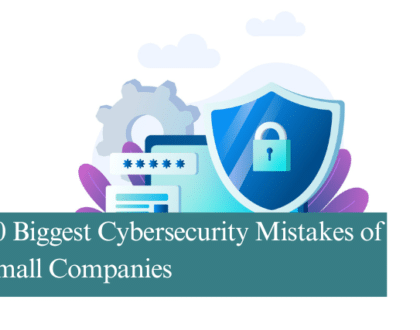
Businesses are heavily reliant on technology to operate efficiently and effectively. From customer transactions to internal communication, digital systems are the backbone of modern enterprises. However, this dependence on technology brings about a critical responsibility: safeguarding those systems against cyber threats and ensuring business operations can continue, even in the face of disruptions.
A comprehensive IT security and business continuity plan is no longer just an option, it is a necessity for any business that wants to protect its data, reputation, and financial stability.
The Growing Threat of Cyber Attacks
Cybersecurity threats are evolving at an alarming pace, and businesses of all sizes are vulnerable. According to recent reports, cyberattacks are one of the most significant risks to businesses, with breaches leading to millions of pounds in losses.
Ransomware attacks, phishing scams, and data breaches are just a few examples of the types of threats businesses face daily. These attacks can compromise sensitive customer data, intellectual property, and critical business systems, causing severe financial and operational damage.
Without a solid IT security plan in place, businesses leave themselves exposed to these risks, with potentially devastating consequences.
The Importance of IT Security
IT security is the first line of defence against cyber threats. A strong IT security plan ensures that sensitive data, networks, and digital infrastructure are protected from unauthorised access, hacking attempts, and malicious software. Key components of an effective IT security plan include:
Firewalls and Intrusion Detection Systems
Firewalls act as barriers between a business’s internal network and external threats. Combined with intrusion detection systems (IDS), they help monitor and block suspicious activities, preventing unauthorised access to critical systems.
Encryption and Data Protection
Encryption is essential for safeguarding sensitive data both in transit and at rest. With strong encryption protocols, even if a cybercriminal intercepts data, they cannot access or exploit it without the decryption key.
Multi-Factor Authentication (MFA)
MFA adds an extra layer of security by requiring users to provide more than one form of verification (such as a password and a fingerprint scan) before accessing systems or data.
Regular Updates and Patch Management
Outdated software often contains vulnerabilities that cybercriminals can exploit. A proactive approach to updating software and patching known vulnerabilities helps prevent security breaches.
Employee Training
Humans are often the weakest link in the security chain. Regular training on recognising phishing scams, using strong passwords, and adhering to security protocols can significantly reduce the risk of successful cyberattacks.
What Happens When Business Continuity Is Not Prioritised?
While IT security protects against cyber threats, business continuity planning ensures that your organisation can continue operating, even when systems are compromised. A business continuity plan (BCP) outlines strategies and procedures to maintain critical operations during a disaster, whether that disaster is a cyberattack, a natural disaster, or a system failure.
Without a well-designed business continuity plan, businesses risk extended downtime, loss of revenue, and the erosion of customer trust. Here are some of the consequences of neglecting business continuity:
Extended Downtime
An unexpected disruption without a continuity plan could lead to extended downtime, making it impossible for employees to perform their duties and customers to access services. In some cases, downtime can last days or even weeks, depending on the severity of the disruption.
Loss of Revenue
For businesses that rely on online sales, digital services, or data-driven processes, downtime can result in lost revenue and sales opportunities. The longer the disruption lasts, the greater the potential for financial loss.
Reputation Damage
Today’s consumers have high expectations for service reliability and data security. If a business experiences significant downtime or a data breach, it can lead to a loss of customer trust and long-term reputational damage. Rebuilding trust after a major incident is difficult and costly.
Compliance Risks
Certain industries are required by law to have disaster recovery and business continuity plans in place. Failure to comply with these regulations can result in fines, legal action, and reputational damage.
How to Create a Strong IT Security and Continuity Plan
Developing a strong IT security and business continuity plan requires careful planning, investment, and ongoing effort. Here are the key steps to ensure your business is protected:
Conduct a Risk Assessment
Identify the critical assets, systems, and data in your business. Assess the potential risks, including cyber threats, natural disasters, and hardware failures, that could disrupt operations. A comprehensive risk assessment allows you to prioritise which areas need the most protection.
Develop IT Security Measures
Implement firewalls, encryption, and strong access controls to protect your business’s data and network. Ensure regular software updates, and provide ongoing training for employees to recognise and respond to security threats.
Establish a Business Continuity Plan
Create a detailed business continuity plan that outlines how to maintain essential operations during disruptions. This plan should include data backup strategies, disaster recovery protocols, and procedures for communicating with employees, customers, and stakeholders.
Test and Update Your Plans
An IT security and continuity plan is only effective if it is regularly tested and updated. Conduct mock drills to simulate potential threats and disruptions to evaluate the effectiveness of your response. Update your plans as your business grows and technology evolves.
Conclusion
In today’s digital landscape, businesses cannot afford to be complacent when it comes to IT security and business continuity. The consequences of neglecting these areas can be severe financially, operationally, and reputationally. A strong IT security plan will protect your business from cyber threats, while a well-thought-out business continuity plan ensures that your operations remain resilient in the face of disruptions.
Investing in both IT security and business continuity is essential for the long-term success and stability of your business. Don’t wait for a disaster to strike, take proactive steps now to protect your business, your data, and your future.
Ready to secure your business? Contact our team today to learn how we can help you develop a comprehensive IT security and business continuity plan tailored to your unique needs.
Recommended Posts

How to Get the Most Out of Your IT Budget
25th April 2025

10 Biggest Cybersecurity Mistakes of Small Companies
18th April 2025

The Importance of Planning in Business IT Solutions
11th April 2025
